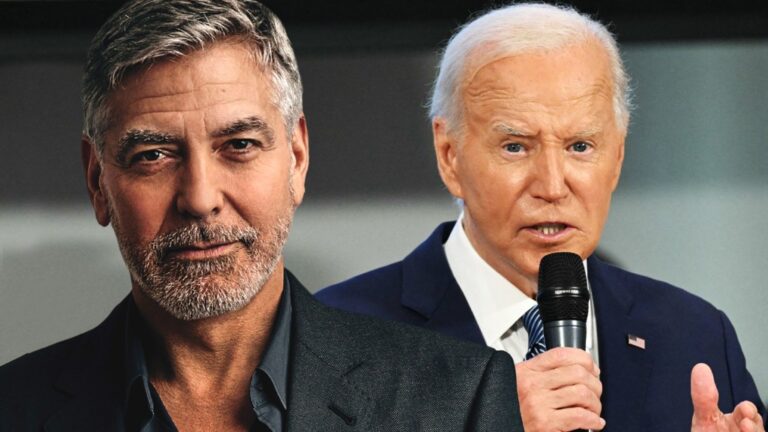
Josh Telles for Deadline/Getty
Robert De Niro has ranted. Bette Midler has denounced “tyranny.” Lea DeLaria has declared war. But Donald Trump, convicted in New York and shot in Pennsylvania, is still marching on Milwaukee, where the Republican National Convention begins tomorrow.
Meanwhile, George Clooney has called for a new Democratic candidate; Rob Reiner has seconded the motion; Damon Lindelof has thrown his support behind the ball and called for a donor strike; yet their abandoned champion, Joe Biden, is still heading to Chicago to try to win the party’s nomination at next month’s Democratic Convention.
When this mess is sorted out (and it inevitably is, sooner or later), Hollywood might want to rethink its political habits, because the current approach clearly isn’t working.
Hysterical behavior on social media and on the red carpet doesn’t win votes; instead, it becomes clickbait for right-wing sites like Breitbart.com, which have created an industry documenting and highlighting celebrity political tantrums.
Getting De Niro, Midler, DeLaria and co. to squash it would be a first step for Hollywood Democrats who want to be taken seriously by their chosen party.
But that might be the easy part.
Much harder, but more interesting, will be the efforts of big donors to set aside the simple, knee-jerk tribal behavior that led to the current embarrassing situation.
And to be clear, it is deeply embarrassing that Clooney, Reiner, Lindelof and many other sophisticated people were publicly endorsing and raising money for Biden just days before his June 27 debate performance revealed what less-clouded observers knew a year ago: that Biden is slipping into the decline of age.
The details aren’t particularly important; what matters is that a Hollywood heavyweight with supposed inside information called on us all to support a candidate he’ll abandon in two weeks.
This shift has cost them credibility, and it’s not going to be restored by the belated call for a more viable candidate. What’s needed after this is a reboot, a rethinking of the Hollywood-Washington relationship.
As Peter Bart pointed out last week, that relationship has changed a lot over the years, including through a generational shift way back when some studio executives thought Jane Fonda was too left-wing and therefore risky to cast in the role. Fun times with Dick and Jane.
In the ’40s, Hollywood went to war with Roosevelt, then split over the blacklist. For John Kennedy, the movies were his playground. During the Reagan years, Hollywood actually produced a president.
Sometime in the 1970s, the modern-progressive nexus took root in what was known as the “holtics” of the Warren Beatty/Gary Hart era. Policy stories and figures circulated on a loose cocktail-party circuit, where Hollywood’s open checkbooks played an increasingly important role. In the early 1990s, journalist Ron Brownstein mapped that interface in his book, Power and brillianceThe general attitude of the time, apart from conservative dissenters in the Wednesday Morning Club, was summed up in the familiar invitation for conversational confidence:We are all Democrats..”
Obedience was expected. When I was a production executive at Sony, no one hesitated to tell me that my contract was coming up for renewal, but that I had to donate $200 to the Clinton campaign. I paid the amount, even though I was planning to vote for Jerry Brown at the time. Later, a senior executive at the company asked me to attend some kind of political rally to support his wife’s run for a Democratic National Convention delegate. I did, but ended up re-registering as an independent “declining statewide.”
Things got more intense during the Bush administration. When I was invited to a little get-together in Hollywood with Howard Dean, I had to sneak out the back door. It got so intense I couldn’t handle it.
Then came Trump, and then the COVID-19 lockdowns, and the two combined to create the angry uniformity, fueled by social media and money, that has now become entertainment’s political culture. The knee-jerk desire to trash Trump inevitably led to self-deception and a deliberate concealment of Biden’s weaknesses. The compromise of an earlier era, when, say, Lew Wasserman and his Universal cronies played both sides, has been replaced by dogmatic intensity.
For Hollywood’s sake, and for all of us’ sake, this monoculture needs to break up. That doesn’t mean Democrats have to support Republicans; that’s never going to happen. But Ari Emanuel, a true political savant, clearly had the right idea when he pointed out in Aspen that donors were suddenly shifting their focus from the presidential race to the House and Senate races.
This is a step in the right direction, a return to the somewhat looser, idea- and policy-driven methods of a vaguely remembered past: think carefully, research, and give it some thought before you write a cheque.
The next step might be something as simple as having a conversation with someone on the other side instead of an accusation about X. You don’t have to agree, but it can’t hurt to know what they think. They might know something. They might save you from a tumble, somersault, or embarrassing turnaround on the opinion article pages. The New York Times.

